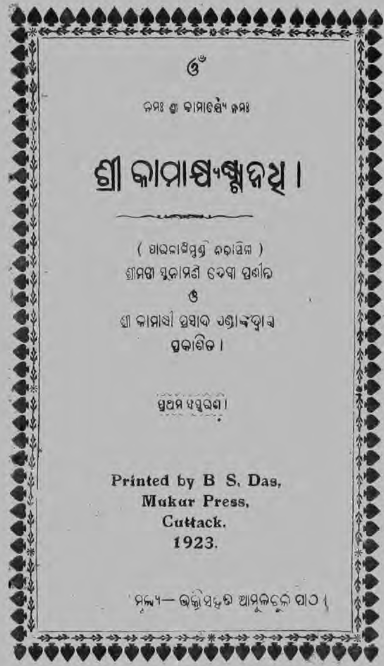Published in 1923, Kamakshi Astanidhi stands as a significant entry in Odia literature, crafted by the talented poet Sunamani Debi. This collection of poetry reflects the rich cultural heritage and literary brilliance of Odia language, showcasing not only the artistic skill of the author but also her profound understanding of human emotions, nature, and spirituality.
Kamakshi Astanidhi is comprised of a variety of poems that embody a harmonious blend of classical and modern influences. The title itself translates to “The Eight Treasures of Kamakshi,” invoking the revered goddess known for her beauty, wisdom, and power. This connection sets the tone for a collection that delves into themes of divinity, feminine strength, and the myriad facets of love and longing.
Each poem in the collection serves as a gem within this literary necklace, exploring different dimensions of existence. Sunamani Debi masterfully weaves elements of nature, mythology, and personal introspection into her verses, bringing forth a narrative that resonates with readers on multiple levels.
One of the distinct features of Debi’s poetry is her vivid use of imagery and symbolism. The natural world often serves as a backdrop for her reflections, with descriptions of blooming flowers, flowing rivers, and the changing seasons symbolizing the cyclic nature of life and death. Such imagery not only enhances the aesthetic quality of the poems but also allows readers to connect their personal experiences with the cosmic rhythm of existence.
In her exploration of feminine identity, Sunamani deftly employs the goddess Kamakshi as a symbol of empowerment. The poems delve into the intricacies of womanhood—embracing strength, vulnerability, and resilience—inviting readers to reflect on the societal roles assigned to women and the innate power they possess. This focus on female empowerment is particularly significant given the historical context of the early 20th century, when women were asserting their rights and identities in various spheres.
Kamakshi Astanidhi is also marked by a strong spiritual essence. Sunamani Debi’s verses take the reader on a journey towards self-discovery and transcendence, echoing the sentiments of devotion and surrender to the divine. The poet’s musings on the nature of spirituality gracefully entwine personal experiences with universal themes, encouraging readers to seek higher truths and connect with the divine presence in their lives.
The devotional aspect of the poetry reflects the influence of Bhakti literature, where love for the divine is expressed through intimate language and emotional depth. This spiritual journey resonates beyond the text, inviting readers to embark on their own quests for meaning and understanding.
Legacy and Relevance
Kamakshi Astanidhi remains a timeless treasure in Odia literature, encapsulating the essence of early 20th-century poetry while retaining its relevance in contemporary society. Sunamani Debi’s voice, imbued with strength and sensitivity, continues to inspire new generations of poets and readers alike. Her ability to articulate complex emotions and ideas with simplicity and grace cements her status as a pivotal figure in the landscape of Odia literature.
Books Info
| Books name | Kamaksi Astanidhi/କାମାକ୍ଷୀ ଷ୍ଟାନିଧି |
| Author | Sunamani Debi |
| No Of pages | 40 |
| Publisher | Kamaksi Prasad Panda |
| Publication | 1923 |
| Printed At | Mukur Press |
| Distributor | NA |

